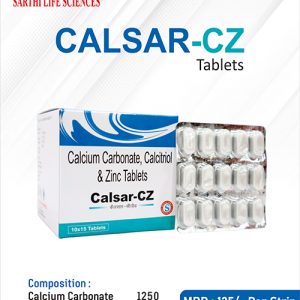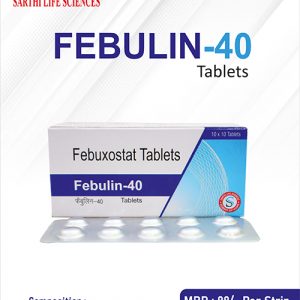Description
Each tablet contains:
-
Pregabalin – 75 mg
-
Methylcobalamin – 1500 mcg
-
Nortriptyline Hydrochloride – 10 mg
Therapeutic Class:
Neuropathic Pain Management
Pregabalin + Methylcobalamin + Nortriptyline Hydrochloride Tablets with the brand “MECOTIN-TP” are used in the management of neuropathic pain associated with diabetic peripheral neuropathy and postherpetic neuralgia. Neuropathic pain is a progressive nerve disease that results from dysfunction of the nerves due to alteration in neural function resulting from nerve injury, disease or interference in nerve communication. It varies from spontaneous pain, unpleasant sensation or feeling, electric shock-like, hot or nail-like sensation, and evoked pain.
Pregabalin + Methylcobalamin + Nortriptyline Hydrochloride Tablets consist of three medicines: Methylcobalamin (vitamin), Nortriptyline Hydrochloride (anti-depressant), and Pregabalin (anti-convulsant). Methylcobalamin is a B vitamin that facilitates the development of the myelin sheath covering the nerve fibres and the formation of new nerve tissue when destroyed.
Nortriptyline Hydrochloride eliminates pain by increasing levels of nerve messengers like serotonin and noradrenaline in the brain to block the pain signals felt. Pregabalin eliminates pain by slowing down the pain messages passed through the brain and down along the spinal cord. Together, it is beneficial in the management of neuropathic pain.
Medical Benefits:
- This tablet is prescribed for symptomatic treatment of peripheral neuropathy, post-herpetic neuralgia due to spinal cord injury, etc.
- Methylcobalamin assists in synthesising myelin, the substance that insulates nerve fibres and regenerates other injured nerve tissues.
- Nortriptyline is an AED that modifies nerve impulses by increasing serotonin and noradrenaline concentrations in the brain, which will reduce the pain impulses to the brain.
- Pregabalin assists by decreasing the messages being communicated between the spinal cord and the brain regarding pain.
Directions For Use
- Take Pregabalin + Methylcobalamin + Nortriptyline Hydrochloride Tablets exactly as your doctor has prescribed without any changes at all.
- Take with food, particularly a tablet, to avoid stomach effects.
- Swallow the tablet whole and do not split it or chew it.
- Please ensure that your child does not take this medication in any form.
- Keep the tablets out of reach of children to prevent incidental ingestion.
- Store the tablets in a cool, dry place away from heat, light, and moisture.
- Always keep the tablets in their original, tightly closed container.
- Make sure to securely close the container after each use to maintain the quality of the tablets.
- Store these tablets away from areas of high humidity.
Precautions
- It can interact with antidepressant drugs (e.g. duloxetine, sertraline, escitalopram), anti-convulsant drugs (e.g. topiramate), and analgesic drugs (e.g. codeine, hydrocodone, morphine, oxycodone, tramadol, acetaminophen), etc.
- Pregabalin + Methylcobalamin + Nortriptyline Hydrochloride Tablets can increase the effect of alcohol; thus, patients are recommended to refrain from drinking alcohol during the medication.
- Use this table with a doctor’s advice if having an anticholinergic effect, cardiovascular disease, pheochromocytoma, following AMI therapy, cardiovascular disease, etc.
- It causes drowsiness, sleep and even vision impairment, so do not drive or use any machinery that requires complete attention.
- Pregnant and breastfeeding women must consult a physician before taking this medicine.
Side Effects
- Dry mouth
- Headache
- Constipation
- Diarrhoea
- Feel sleepy, tired or dizzy
Frequently Asked Questions (FAQs)
Can I discontinue this tablet if I’m feeling well?
No, do not stop taking it without the advice of the doctor. Sudden withdrawal from this drug can cause withdrawal of symptoms. Finish the doctor’s prescription as advised.
Is it used in diabetic neuropathy?
Yes, this drug is prescribed for diabetic neuropathy that is nerve damage due to high blood sugar and tends to affect legs and feet.
Does it produce oedema?
Yes, it can cause peripheral oedema, which is swelling in the area around the hands and feet. To reduce swelling, avoid sitting or remaining for extended periods on the feet and during sleep, place a pillow under the legs.
How to manage dry mouth?
Dry mouth is a common side effect of this drug. To control it; have water frequently, chew sugar-free gum or candy to stimulate saliva, reduce or avoid caffeine intake and smoking and employ alcohol-free mouthwashes.







